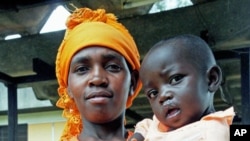Operation Smile is a global non-profit medical group that provides free reconstructive surgery to children and adults with cleft lips or cleft palates in dozens of countries worldwide.
Baby Emmanuel - at just seven months old - may be the youngest of patients to come to Kigali’s Central University Hospital. His nurse said he just received a procedure that may change the course of his life, but he doesn’t know that yet.
“He’s a little bit upset because he’s not quite awake yet. He needs to sleep a little bit more and he’ll be fine."
Operation Smile’s Rwanda team is made up of volunteer doctors from 10 different countries. They perform reconstructive surgery for people with cleft palates and/or cleft lips.
A cleft lip is a hole in the lip that has caused the lip to not fully form, and a cleft palate is a hole in the roof of the mouth.
Patients from every corner of Rwanda made the journey to the capital of Kigali for a chance at this procedure.
Oxygen and suction machines buzz as South African plastic surgeon, Conrad Pienaar, describes the process while he performs an operation on a patient under anaesthesia.
“I’m repairing a kiddy with a cleft pallet. He had a bi-lateral or unilateral-cleft lip, as well as palate, and on one of the previous missions his lip has been repaired and now the second stage is closing up the whole palate. This one is going very well and we’re almost done. We wonder why do we close up the palate and there’s essentially three reasons: the palate is very important for normal speech; and for eating and drinking; an then also for hearing,” said Pienaar.
Operation Smile procedures are a boon to Rwandan patients who would not otherwise have access to advanced surgeries. But the missions also are rewarding for volunteer doctors who benefit from exposure to new places and cultures.
“The people are extremely friendly here in Rwanda," said Dr. Ben Hu, a pediatric intensivist from the United States. "I’m amazed how - even looking outside - the families help each other. They’ve probably never met before and they just support each other. You really don’t see that in San Francisco. It’s refreshing.”
Dr. Amie Lokulutu of the Democratic Republic of Congo is the Regional Director for Operation Smile. He said the organization’s missions throughout the world, including those in Rwanda and other parts of Africa, have been a success.
"We’ve organized missions since 1982 and we’ve been able to provide surgeries for about 200,000 patients around the world in 60 countries, 13 African countries. And in Rwanda - we’ve been here since 2009. We’ve already performed two missions and this is the third one," he said.
Here in Rwanda, Operation Smile has performed more than 500 surgeries to date.
News
International Surgeons Bring Reconstructive Surgery to Rwandans




